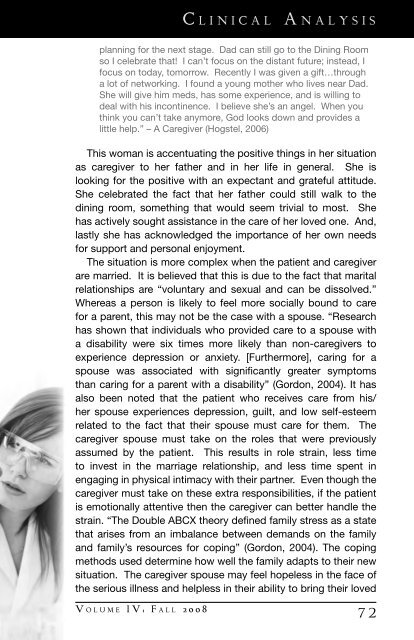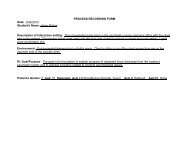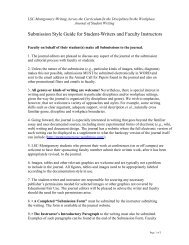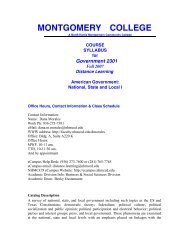2008 - Communication Across the Curriculum (CAC)
2008 - Communication Across the Curriculum (CAC)
2008 - Communication Across the Curriculum (CAC)
You also want an ePaper? Increase the reach of your titles
YUMPU automatically turns print PDFs into web optimized ePapers that Google loves.
planning for <strong>the</strong> next stage. Dad can still go to <strong>the</strong> Dining Room<br />
so I celebrate that! I can’t focus on <strong>the</strong> distant future; instead, I<br />
focus on today, tomorrow. Recently I was given a gift…through<br />
a lot of networking. I found a young mo<strong>the</strong>r who lives near Dad.<br />
She will give him meds, has some experience, and is willing to<br />
deal with his incontinence. I believe she’s an angel. When you<br />
think you can’t take anymore, God looks down and provides a<br />
little help.” – A Caregiver (Hogstel, 2006)<br />
This woman is accentuating <strong>the</strong> positive things in her situation<br />
as caregiver to her fa<strong>the</strong>r and in her life in general. She is<br />
looking for <strong>the</strong> positive with an expectant and grateful attitude.<br />
She celebrated <strong>the</strong> fact that her fa<strong>the</strong>r could still walk to <strong>the</strong><br />
dining room, something that would seem trivial to most. She<br />
has actively sought assistance in <strong>the</strong> care of her loved one. And,<br />
lastly she has acknowledged <strong>the</strong> importance of her own needs<br />
for support and personal enjoyment.<br />
The situation is more complex when <strong>the</strong> patient and caregiver<br />
are married. It is believed that this is due to <strong>the</strong> fact that marital<br />
relationships are “voluntary and sexual and can be dissolved.”<br />
Whereas a person is likely to feel more socially bound to care<br />
for a parent, this may not be <strong>the</strong> case with a spouse. “Research<br />
has shown that individuals who provided care to a spouse with<br />
a disability were six times more likely than non-caregivers to<br />
experience depression or anxiety. [Fur<strong>the</strong>rmore], caring for a<br />
spouse was associated with significantly greater symptoms<br />
than caring for a parent with a disability” (Gordon, 2004). It has<br />
also been noted that <strong>the</strong> patient who receives care from his/<br />
her spouse experiences depression, guilt, and low self-esteem<br />
related to <strong>the</strong> fact that <strong>the</strong>ir spouse must care for <strong>the</strong>m. The<br />
caregiver spouse must take on <strong>the</strong> roles that were previously<br />
assumed by <strong>the</strong> patient. This results in role strain, less time<br />
to invest in <strong>the</strong> marriage relationship, and less time spent in<br />
engaging in physical intimacy with <strong>the</strong>ir partner. Even though <strong>the</strong><br />
caregiver must take on <strong>the</strong>se extra responsibilities, if <strong>the</strong> patient<br />
is emotionally attentive <strong>the</strong>n <strong>the</strong> caregiver can better handle <strong>the</strong><br />
strain. “The Double ABCX <strong>the</strong>ory defined family stress as a state<br />
that arises from an imbalance between demands on <strong>the</strong> family<br />
and family’s resources for coping” (Gordon, 2004). The coping<br />
methods used determine how well <strong>the</strong> family adapts to <strong>the</strong>ir new<br />
situation. The caregiver spouse may feel hopeless in <strong>the</strong> face of<br />
<strong>the</strong> serious illness and helpless in <strong>the</strong>ir ability to bring <strong>the</strong>ir loved<br />
V o l u m e I V : F a l l 2 0 0 8<br />
C l i n i c a l A n a l y s i s<br />
7 2






